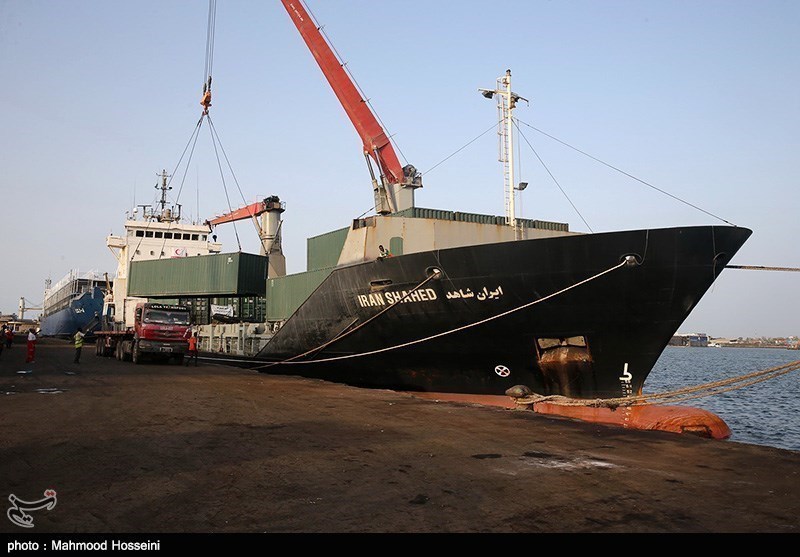
The Islamic Republic blinked last week. It backed off its insistence that it would send a shipload of relief supplies directly to Yemen and not allow anyone to inspect them first to make sure there were no arms aboard.
Instead, it docilely sailed the relief ship into port in Djibouti, just as the United States had said it ought. The UN has its Yemen relief headquarters in Djibouti, which lies just across the Red Sea from Yemen.
In Djibouti, the Iranian ship was unloaded and the UN took possession of the relief supplies.
The United States has been very concerned about arms supplies being delivered by ship to the Houthi rebels in Yemen.
Earlier this month, Iran sent a convoy of cargo ships plus two warships to Yemen with what Iran said was relief. After the US Navy converged on the Iranian ships, the convoy turned tail and returned to Iran—telegraphing that its cargo was something other than innocent relief supplies.
The latest ship was carrying 2,400 tons of supplies plus some European and American peace activists. It looked like Iran was trying to set up a confrontation with the US Navy, much as a Turkish relief ship bound for Gaza got into a bloody confrontation with the Israeli Navy a few years ago.
All the time the relief ship was sailing, the Iranian media carried reports on the date it would arrive in the Yemeni port of Hodeidah, controlled by the Houthi rebels, plus slanging language against any American or Saudi interference with the vessel.
On May 13, Foreign Ministry spokeswoman Marziyeh Afkham said, “No permission will be granted to countries involved in the war on Yemen to inspect the ship carrying the Islamic Republic of Iran’s humanitarian aid.” It was noted that she aimed that policy at the US and Saudi Arabia, which have warships off Yemen. But she avoided saying anything at all about a UN inspection, hinting that the government was already considering ducking a confrontation a week before it actually sent the ship to Djibouti on May 20.
The same day Afkham spoke, however, the Defense Ministry denounced any idea of going to Djibouti. It called the American proposal “illogical.” In a statement, it said, “There is no guarantee that the aid will be delivered to the oppressed Yemeni people. If international organizations, especially the UN, really want to help the oppressed Yemeni people, they should adopt the necessary measures to prevent the Saudi regime’s savage attacks.”
The dueling Foreign Ministry and Defense Ministry statements suggested there was tussle between the two, which the Foreign Ministry eventually won.
On May 12, an overwrought Brig. Gen. Masud Jazayeri threatened to launch war against any state daring to attack any Iranian relief vessel. That threat was never repeated, suggesting it was too much for the rest of the regime.
But, in the end, the ship did exactly what the United States said it ought to do and sailed for Djibouti without ever getting near Hodeidah.
At one point, the US Navy said two Iranian Navy vessels had joined up and were escorting the relief ship. The peace activists—German Christoph Horstel and Ohioan Caleb Maupin—on board the relief ship got on the radio and denied that flatly. They oppose any military involvement. But the skipper of the relief ship told reporters two Iranian Navy ships in the Gulf of Aden had indeed been escorting the relief ship.
Iran did not admit to caving into US pressure. Instead, the deputy head of the Iranian Red Crescent Society, which owns the ship, said it was decided to sail for Djibouti since the five-day ceasefire in Yemen had not been extended. But the ceasefire had not really been observed at all, so that struck many as a poor explanation.
Meanwhile, there are two other ships of concern—foreign ships that Iran has chased after in legal disputes.
The Maersk Line told the Iran Times Monday that it still has not paid Iran any money as a result of a decade-old dispute over undelivered cargo. The Pasdar maritime arm seized a Maersk cargo ship April 28 demanding payment. But, after an international uproar, Iran freed it nine days later with no payment made.
Then on May 14, the Pasdar chased and tried to seize the Singapore-flagged Alpine Eternity, but that ship outran the Pasdaran. The Iran Times has sent questions to the ship’s manager, but that firm has not responded. The Iranian government made no comment on the Alpine Eternity until six days after the aborted chase, when the Foreign Ministry said it was gathering information about the an incident in March where the Alpine Eternity reportedly collided with a rig in an Iranian gasfield. Rather curiously, the Foreign Ministry did not accuse the ship of any wrongdoing.